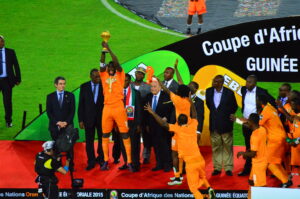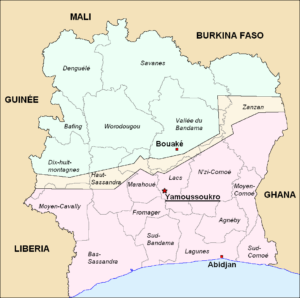AFCON Archives 2010s: Renard’s Ivory Coast turn torment to triumph
Harry Houdini could hardly have dreamt up Ivory Coast’s escape from the group stages of the 2023 Africa Cup of Nations.
The host nation progress to face Senegal in today’s round-of-16 clash despite registering three points and negative-three goal difference in Group A. To add to the mania, The Elephants parted ways with coach Jean-Louis Gasset on Thursday and then approached the last manager to bring them AFCON glory: Hervé Renard.
Though their ‘loan’ approach for Renard has since been rejected, it is worth revisiting that 2015 victory. What vital lessons can it teach the host nation now? How did it crown the golden generation of the 2000s? Why does football mean so much in the Ivory Coast?

The Golden Generation, the World Cup, and the Civil War
Ivory Coast would have to wait until 2015 to claim continental honours, but they had been touted as Africa’s premier team for nearly a decade by this point.
Didier Drogba, Emmanuel Eboué, and Kolo Touré headlined Ivorian starting line-ups in the mid-2000s, while Kolo’s younger brother Yaya was waiting in the wings.
Ivory Coast lineup during the 2006 AFCON
Though Ivorian football was showing great promise, the nation was in dire straits.
Since a failed coup in September 2002, Ivory Coast had been gripped by civil war.
A fissure emerged between the rebel-held north and the loyalist south, and the ensuing violence questioned the very fundaments of Ivorian identity.

In the south, President Laurent Gbagbo and the Front Populaire Ivoirien (FPI) stressed nativist identity and autochthonous rights – historical claims to land.
In the north, rebel groups amalgamated as the Forces nouvelles de Cote d’Ivoire.
Viewing the 2000 elections as illegitimate, the rebels demanded the termination of Gbagbo’s presidency and fresh elections in its wake.
Gbagbo in 2003
The golden generation played with the weight of this divided nation on their shoulders.
That pressure was at its most intense as Drogba and The Elephants travelled to Omdurman to face Sudan in World Cup qualifying during October 2005.
In the quest for a first ever appearance at the World Cup, anything less than a win would hand qualification to Cameroon.
Meanwhile, The Indomitable Lions hosted Egypt with the knowledge that a win would send them to Germany and quash Ivorian hopes.
Cameroon boasted Samuel Eto’o as their star player
On October 8th, these two high-stakes fixtures unravelled in dramatic fashion.
The Elephants took care of business in Omdurman, winning 3-1 on the back of an Aruna Dindane brace.
Dindane in action during 2005
With the scores level in the dying minutes of Cameroon and Egypt’s tie, Ivorian dreams looked set to become reality.
However, disaster struck when Cameroon were awarded a 96th minute penalty.
The hopes of two nations now rested on the left-boot of Pierre Womé, who took aim from twelve yards.
Ivorian hearts pounded, but their ears were greeted with the sweet music of the woodwork when Womé’s low strike cannoned out off the post.
📅 💭
🇨🇲 Pierre Wome missed a stoppage-time penalty, costing Cameroon a record sixth World Cup finals appearance and enabling Ivory Coast to go through on a day of shocks in the African qualifying matches.#AfricaWorldCupMoments 🏆 #FIFAWorldCup pic.twitter.com/ZmLS9U7ZRN
— GOAL Africa (@GOALAfrica) September 5, 2021
The Elephants would stamp the name of their war-torn country on the global stage.
They had given cause for celebration in a barren time, but they wanted to do more.
Ivory Coast at their first ever World Cup
The Ivorian press were invited into the changing room, and Didier Drogba – microphone in hand – began addressing the nation.
“We promised you that the celebration would unite the people.
“Today, we beg you on our knees,” he said.
Joined by the squad in taking a knee, Drogba continued.
“The one country in Africa with so many riches must not descend into war please lay down your weapons,” he pleaded.
On this day in 2005, Didier Drogba made a speech to the nation which helped convince the government & opposing Forces to hold a ceasefire & restart peace talks.@didierdrogba 🇨🇮 #AfroBallers #IvoryCoast pic.twitter.com/vEysopDhn8
— AfroBallers (@afroballers) October 8, 2020
Drogba’s appeal would be widely broadcast in the weeks, months, and even years that followed.
The crisis had not been remedied overnight, but The Elephants had provided a poignant window into an alternative Ivory Coast – one that could compete and celebrate as one.
Drogba’s speech played a significant role in influencing de-escalation, and the forward would help punctuate the dawn of peace when the first Ivorian Civil War concluded in 2007.
As the nation celebrated his African player of the year award, Drogba insisted that Ivory Coast’s upcoming fixture against Madagascar should be played in Bouake – the heartland of the rebellion.
This was a powerful symbolic gesture, especially since the forward hailed from the South.
The game went ahead on June 3rd 2007 and Drogba scored the fifth in a fairy-tale five-goal win.
Former Ivorian footballer Sebastien Gnahore remembers this moment fondly.
“It was euphoria across the whole country, everybody came together,
“We had so much hope in Drogba and his team. The Toures from the north, Drogba from the south. It was a true Ivorian mosaic,” he told the BBC.
Hostilities sadly resurfaced in 2011, but Drogba’s role in shaping peace will never be forgotten.
AFCON Agony
The Elephants had fulfilled the World Cup dream of a despairing nation, but they were unable to bring continental glory to Ivory Coast.
The decade preceding the 2015 triumph was a story of penalties and pain.
The Elephants reached AFCON finals in 2006 and 2012, but fell to penalty shootout defeats against Egypt and Zambia respectively.
Drogba, so often the man for the big occasion, fell short in both these finals.
Drogba netted the decisive penalty in the 2012 Champions League final
In 2006, he stepped up to take Ivory Coast’s first penalty in the shootout, but saw his effort denied by Essam El Hadary.
He found the net in the shootout against Zambia, but he had blazed over from the spot in the 70th minute of the goalless draw.
Yaya Touré comforts Drogba after the miss
The legendary Chelsea striker retired from international football in 2014, one year before Hervé Renard’s Elephants claimed the trophy in Equatorial Guinea.
However, his failure to win an AFCON trophy has certainly not diminished his standing in Ivorian legend, nor has it left the striker with any regrets.
Drogba’s vehicle is swamped by Ivorian fans during 2020
“Sometimes my French friends ask me if I regret not playing for the French national team instead of the Ivorian national team, and I always say no.
“The relationship Zidane has with France and French people as a World Cup winner, a legend, an icon is one thing.
“But the relationship I have with my country and continent is richer than that. It’s more responsibility, it’s more difficult but it means more too,” he told AFROSPORT.
Drogba never shied away from that responsibility, and he shared in Ivorian joy when a long awaited and well-deserved AFCON came in 2015.
Redemption under Renard
Hervé Renard was appointed as the Ivory Coast’s manager following their group stage exit at the 2014 World Cup.
The Frenchman was a familiar face for The Elephants, having been in the opposing dugout during the 2012 AFCON final.
Renard is the only manager to win AFCON with two nations
Renard came as Drogba departed, meaning that Yaya Touré would be the captain and undisputed star of this Ivorian side.
Then starring for Manchester City, Touré claims he was a big influence in Renard’s appointment.
“I was the one who was pushing the President of my Federation to sign him.
“We said we want to win the AFCON, so get this one [Renard] – if you don’t get this one, I’m not coming!” he told BBC Sounds.
As the tournament rolled around, it was clear the respect went both ways.
After drawing 1-1 with Guinea in their opening game, Renard insisted that Elephants’ hopes hinged on the performances of their talisman.
“He has a big responsibility now with the captain’s armband. I expect a better second game from him than the first one.
“If he is not able to improve his level it will be difficult for the team,” he said.
Tactical adjustments were made too, with Renard returning to his trusted back-three and defensive prognosis.
Serge Aurier shone as a wing-back
Though a change in fortunes was not immediate – they drew 1-1 with Mali before securing progression through a 1-0 win over Cameroon – Renard was confident that he had cracked the formula ahead of their quarter-final tie with Algeria.
“It’s not necessary in a big competition to start quickly: it’s a very difficult competition, but these sort of players they are ready to be competitors. We are thinking only of victory,” he said.
Touré, on the other hand, remained an unsolved question heading into the knockouts after three unremarkable performances in the group stages.
Prized for his goalscoring at Manchester City, Touré’s responsibilities in this Ivory Coast side were more wide-ranging.
“At City there are a lot of players able to defend very well and bring the ball and build the game, notably Fernandinho who works like a madman alongside him,” Renard explained.
Despite Touré’s struggles, The Elephants marched into the semi-finals.
A late Gervinho goal added to a Wilfried Bony brace as the Ivorians defeated Algeria 3-1 in a nervy affair.
Being mandated to wear a pink bib on the sidelines had not dampened Renard’s mood, so he revelled in the spoils of The Elephants’ pragmatic play.
Renard’s white shirt clashed with the Algerian kits
“I think we have beaten the best team in the tournament. We needed to be very well organised and try to counter a team who are very strong individually.
“We had a spell just before their goal where we were struggling, but we reorganised the team, and with players like Gervinho going forward we will always have the opportunities to make the difference,” he said.
Touré finally made his mark on the tournament as the Ivorians trumped DR Congo 3-1 in the semi-finals, opening the scoring with a thundering half-volley in the 20th minute.
His overall performance won praise too.
“I hear a lot of people saying things about Yaya Touré in Africa, but he’s a big player.
“He showed to all the people that this is the semi-final, and suddenly he can do it. It was an amazing goal,” said Renard.
They then faced Ghana in the final – their third in the space of a decade.
After a goalless 120 minutes, it looked to be a familiar story for The Elephants.
Penalties dawned, and misfires from Bony and Junior Tallo on their first two spot-kicks placed another bitter ending on the horizon.
Bony hits the woodwork
However, a glint of hope was restored as Boubacar Barry saved from Afriyie Acquah and Serge Aurier lashed home.
Frank Acheampong then fired wide, leaving both sides with two misses apiece.
Thirteen perfect penalties followed, meaning that the goalkeepers stepped up for both sides.
Brimah Razak was denied by Barry, leaving the Ivorian goalkeeper with a chance to claim their first AFCON since 1992.
Barry gets down quickly to his left and saves
As Barry fired the ball into the right-corner, rapturous celebrations erupted in both the stadium and Drogba’s living room.
The Golden Generation had been crowned.
As the current side languish in front of an expectant home crowd, they are hardly foolish to turn to Renard.
Though they have failed to tempt him back, they can find inspiration in his words.
“It’s not necessary in a big competition to start quickly.”
Indeed, it is how you finish that counts.
You can read the full AFCON Archives collection here.